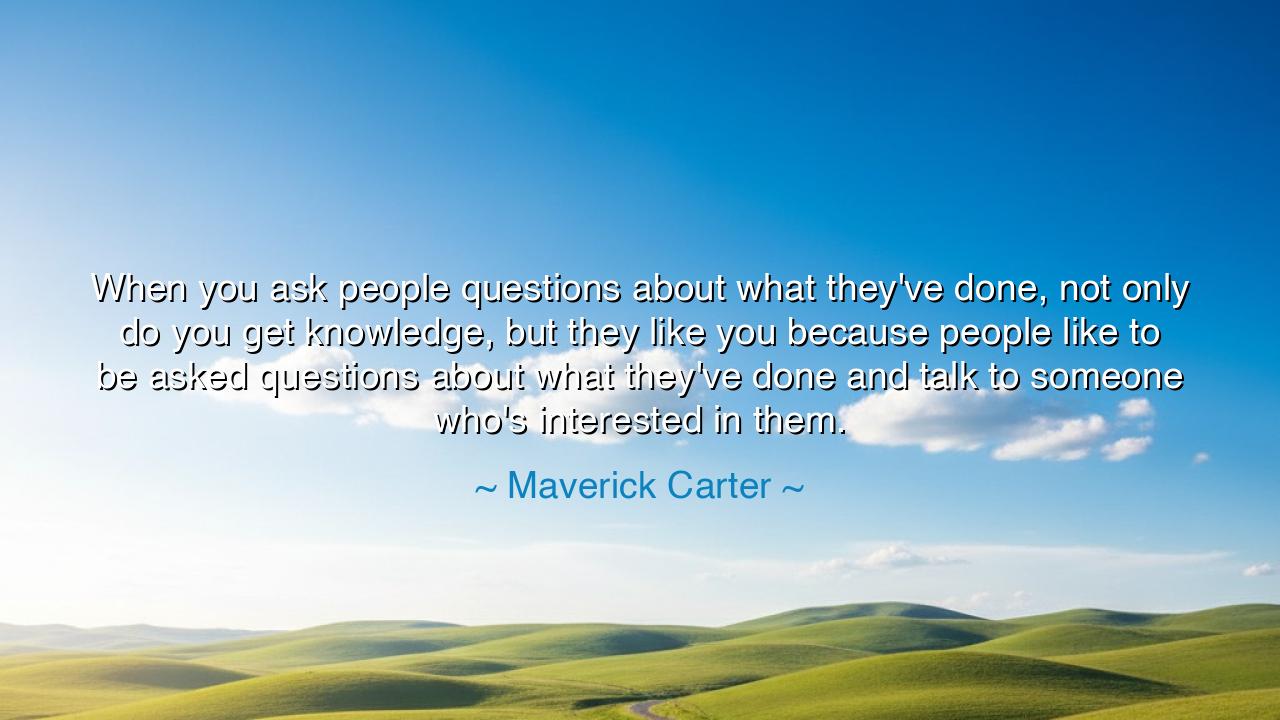
When you ask people questions about what they've done, not only
When you ask people questions about what they've done, not only do you get knowledge, but they like you because people like to be asked questions about what they've done and talk to someone who's interested in them.






The words of Maverick Carter—“When you ask people questions about what they've done, not only do you get knowledge, but they like you because people like to be asked questions about what they've done and talk to someone who's interested in them”—are a reflection of one of the oldest and most powerful truths in human connection: that curiosity is the bridge between souls. To ask sincerely is to honor another’s experience; to listen deeply is to invite wisdom into your own heart. Carter’s insight is not about flattery or strategy—it is about the sacred exchange that occurs when respect and curiosity meet.
In ancient times, the philosophers of Athens understood this well. Socrates, the father of inquiry, taught through questions rather than proclamations. He knew that knowledge grows not from the arrogance of speech, but from the humility of listening. Each question he asked was a key unlocking the mind of another, revealing not only truths about the world but truths about themselves. And those who spoke with him did not feel interrogated—they felt seen, as though their thoughts mattered in the vast conversation of existence. Such is the power of asking about another’s deeds: it transforms mere talk into communion.
Carter’s words also speak to the deep yearning within every human heart—the desire to be acknowledged, to have one’s story heard. To be asked about one’s journey is to be granted dignity. When we ask others about what they have done, we awaken in them the joy of recognition. It is a subtle but profound act of generosity, for in showing interest, we give the gift of attention—the most precious currency in a distracted age. And yet, as Carter reminds us, in giving this gift, we receive one in return: knowledge. Every person carries within them a universe of experience, lessons won by time and trial. Those who ask and listen become travelers across these inner worlds, gathering the wisdom of many lives.
There is a tale of Alexander the Great, who, despite his might and conquest, sought counsel from philosophers, generals, and poets. He would listen intently to their stories, asking questions about their choices, their failures, and their triumphs. He understood that power without understanding is blind, and understanding is born from curiosity. His greatness was not in the armies he commanded, but in the questions he asked and the knowledge he drew from others. Even the wisest kings knew that humility before another’s experience is the beginning of mastery.
Carter’s teaching also carries an emotional truth that transcends intellect: people like those who genuinely care about their experiences. This is not manipulation—it is the natural law of the heart. When we take the time to inquire about others, to understand their labor, their dreams, their scars, we become companions in their journey. In this shared space, friendship and trust blossom. A conversation built on mutual curiosity becomes a bond; it heals loneliness and nurtures respect. The ancient sages might have called this the alchemy of empathy—turning simple words into gold.
In the modern world, where noise often replaces dialogue, Carter’s words are both a reminder and a warning. To speak endlessly of oneself is to live in a desert of understanding. To ask and listen, however, is to live by a river, always flowing, always renewed. The wise do not seek only to be heard; they seek to hear. The foolish talk to display their knowledge; the wise ask to expand it. For every question sincerely asked is a seed of wisdom planted in the soil of humility.
Let this be the lesson for those who seek to lead, to teach, or simply to love: ask with sincerity, listen without interruption, and learn without pride. Approach each conversation as a pilgrimage toward truth. Whether in business, friendship, or family, remember that people remember not what you said, but how deeply you cared to understand them.
For in the end, Maverick Carter’s wisdom reveals the simplest and most enduring path to greatness—not through domination, but through connection. When we ask about others, we do not just learn about their deeds; we awaken their light, and in that shared illumination, we find the essence of what it means to be human.






AAdministratorAdministrator
Welcome, honored guests. Please leave a comment, we will respond soon